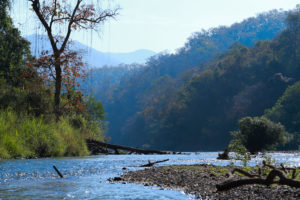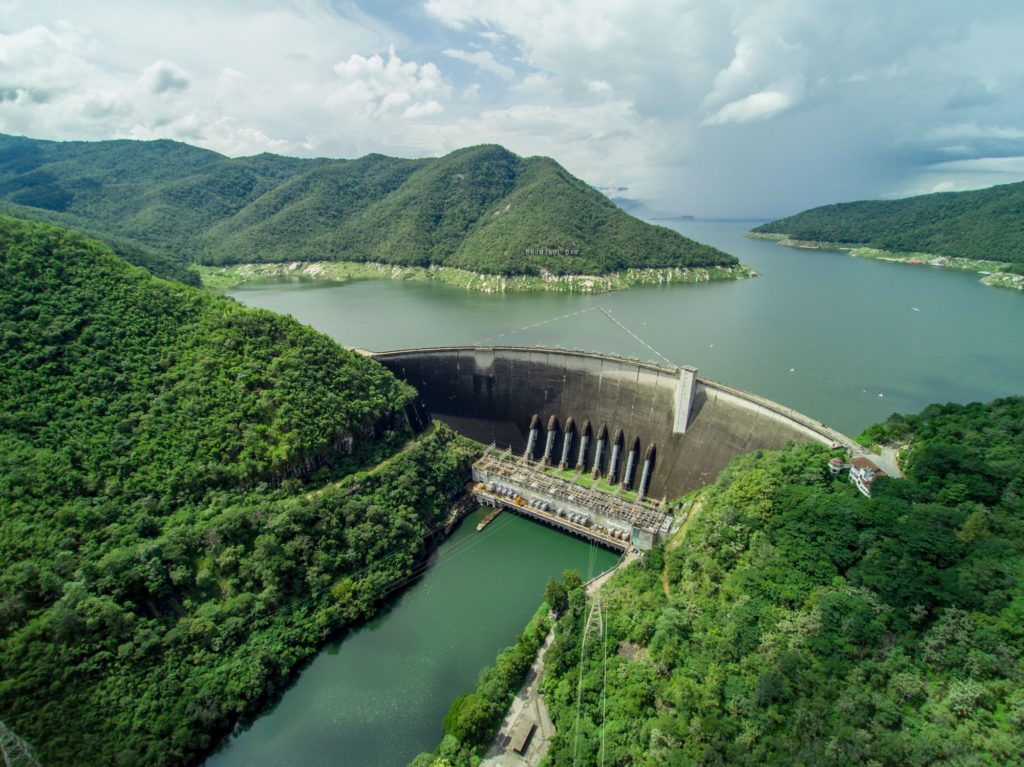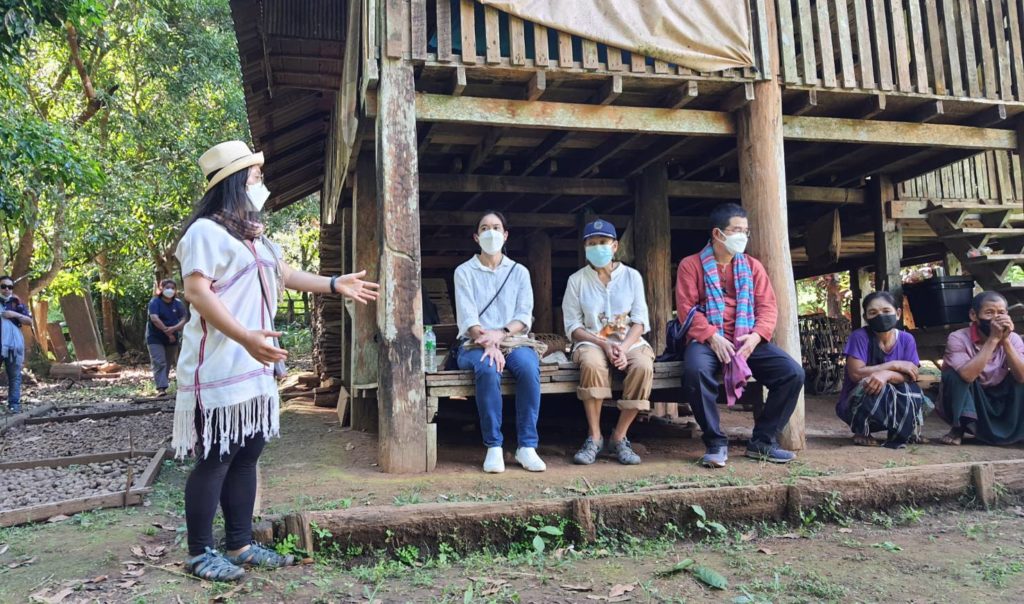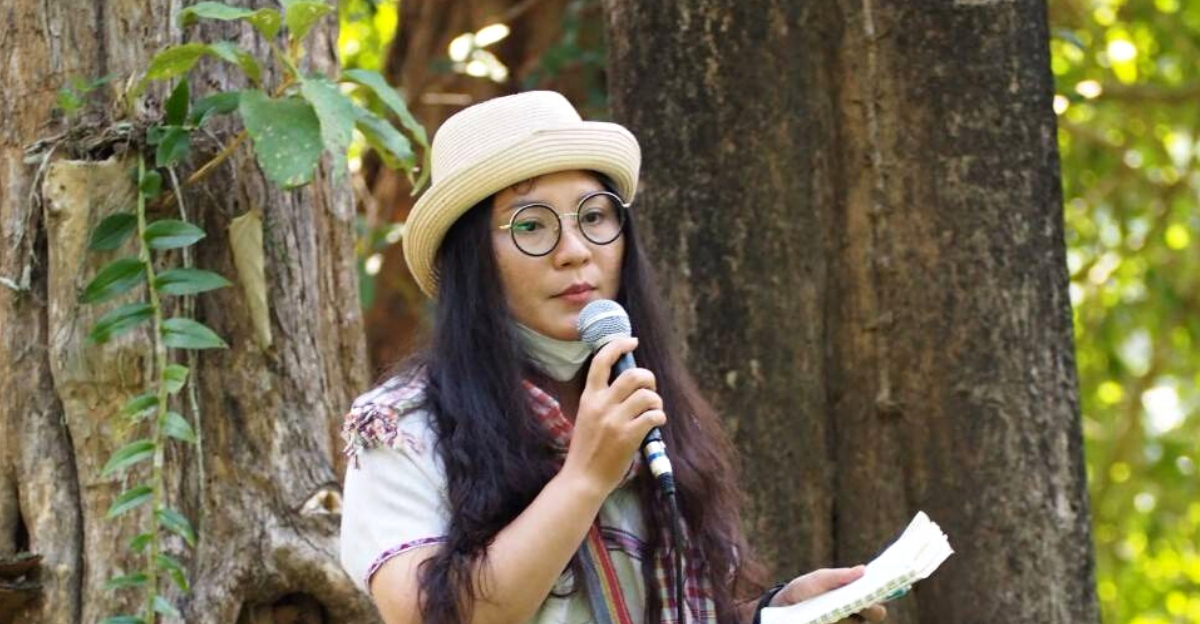By Petro Kotze and Nalori Chakma
Once an ‘unseen’ person, she now helps ensure her community does not disappear
When I was born, my father tied my umbilical cord around a tree in the forest, says Mueda Nawanat. Mueda is from the Ban Tha Rua village in Thailand’s Sob Moei District in the Mae Hong Son Province close to the border with Myanmar. The spirit of the tree protected me as a child; as an adult, I have to protect the tree, she says. “I must not allow it to be cut down.” Every child in the community has a tree, Mueda says, and so the forest is protected.
Surrounded by forests, the village of Ban Tha Rua rests on the banks of the Yuam River, a tributary of the Salween. Villagers live in close harmony with both the forests and river. Here, boats are their only method of transport. The village has no school or hospital, so they use the river to travel there; neither do they have electricity, so the river is their connection to the outside world. “My people have little money”, Mueda says, “but they live off fish, the forest, and from their small farming plots. They believe they must protect what they use”, she says. “No forest, no water.” Ceremonies to bless the spirits of the water and forest and, thank them for their protection are part of their everyday lives.
However, Ban Tha Rua might soon disappear. “Everything. Gone.” If the Yuam river water diversion project goes ahead, my whole village will be covered in water, so will our spirit trees, the forest, my childhood, our culture and indigenous knowledge. “It will all stop.”

“Everything. Gone.”
Mueda’s village is the first upstream of a planned reservoir; part of a contentious project to divert water across Thailand to the Ping River and Bhumibol Dam. The project affects the Moei River on the Thai-Myanmar border, as well as the Yuam River. On the latter, a dam with a 70-metre-high wall is set to be constructed, from which water will be pumped into a storage facility and then transported along a 62km tunnel passing through at least 14 villages.
The project is built on the promise of “free water” for farmers in Thailand’s central provinces but the actual benefits have withered under interrogation. Over and above that, in return for building the scheme’s dam and pipeline for free, Chinese state-owned enterprises get the right to construct hydroelectric dams on the Salween River, one of the longest and last free-flowing rivers in the world.
The Thai government-supported project has elicited serious concern and increasing backlash from the public and NGOs. The dubious Environmental Impact Assessment (EIA) has been rejected twice over concerns about the surrounding forests, fisheries, tunnel excavation materials and compensation for communities. The price at stake is significant. At least five protected forests, including national forest reserves and national parks that span three provinces and contain some of Thailand’s last surviving lush and abundant natural forests, stand in the project’s way – as do the homes and villages of many local communities.

Against tremendous odds, the people of Ban Tha Rua are insisting their human rights be heard, with Mueda one of those at the forefront of the fight. Her journey has been riddled with difficulties and before she could help her people find their voice, she first had to find hers.
Giving a voice to the voiceless
She turned to activism when she was 14, when there was talk of another water diversion project that would seriously affect her community, though authorities did not recognize the danger they were in. The people from Ban Tha Rua are home to mostly ethnic Karen highlanders, so-called ‘stateless’ people who do not have Thai citizenship and do not have the legal right to claim title to their ancestral lands. “Because we were stateless, and an ethnic minority, nobody cared about my village”, Mueda says. “That made me feel hurt and sad. We are also human.”
Mueda started a campaign against the development and, in the subsequent meetings she attended, one aspect was repeatedly discussed: the law. All the adults spoke about how they should use the law, and how it could help them. To the young teenager, the law sounded like the key to unlocking access to their rights. Mueda decided to study law, not only for herself but also, when she was qualified, to return to her village and help her people.
She won a scholarship to study law at Payap University and, when she qualified in 2015, used her knowledge to secure her own Thai citizenship. Today, Mueda is an indigenous rights defender and human rights lawyer. She has now returned to Ban Tha Rua to help fight the planned water transfer project. She trains community leaders about the law and their legal rights and represents the village at public meetings. She has also submitted multiple letters to the government to raise the issue, and others, to call for support from abroad.

However, she is most proud of the youth group she established along the Yuam River. “They come together to learn about the proposed development, what it means for them, what their rights are and what they can do”, she says. “Then, they convey this information to the community, many of whom cannot read or write, or speak the official Thai language. As a result, they were not aware of what would happen to them.”
The change in the community has been inspiring, she says. “Before, they were too scared to speak and think they had no rights because they are stateless. Now, they stand up for themselves and they speak with a strong voice. They are determined to protect the river even though the challenges are substantial”. The journey has not been easy for Mueda. She had to work very hard to earn the community’s respect. In my culture, women grow up to serve their families, they don’t traditionally leave to go and study. With few role models to pave the way, she says people have looked down on her for her choices but she persevered. She has learned valuable lessons about herself throughout the years.
Personal victories that make for a stronger fighter
Life as a stateless person is very difficult, she says. “When I was still stateless I didn’t have any rights; I didn’t have freedom of expression; or, freedom of movement. People say a stateless person is of no use to their country”, something Mueda says still hurts her feelings very much, but she had to stand up and show them that she is not a bad person. “I have used all the difficulties I’ve faced in my life to develop and push myself.”
She says that ultimately, you have to accept who you are. “I needed to stand up and say that I am stateless, and an ethnic person, and accept that about myself”, Mueda says. “If you do not accept yourself first, people in society will not accept you.”
Some of the lessons have been particularly hard. “I will not say that I believe that anymore”, Mueda says about her teenage self’s hope that the law is key to protecting people’s rights. Today, she relies on something else: regardless, Mueda says, “we still have to live with hope”.
International Rivers’ South Asia program is part of the regional Transboundary Rivers of South Asia program. Supported by the Government of Sweden, TROSA is a collaboration with Oxfam, IUCN, ICIMOD and many local organizations that works on some of the more complex rivers in South and Southeast Asia: the Ganga, Brahmaputra and Meghna river systems, including their tributaries such as the Teesta, and Asia’s last last free flowing river, the Salween. The program aims to contribute to poverty reduction and marginalization among vulnerable river basin communities through increased access to and control over riverine water resources on which their livelihoods depend.

